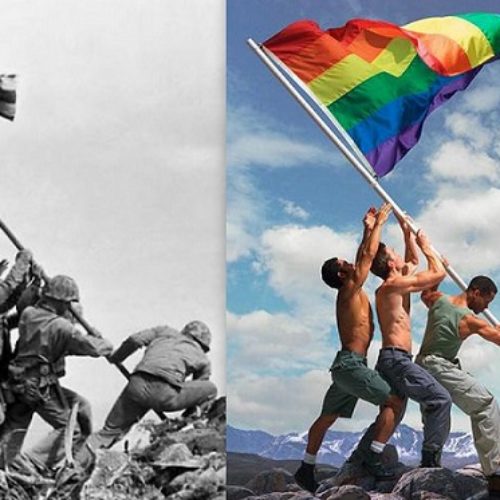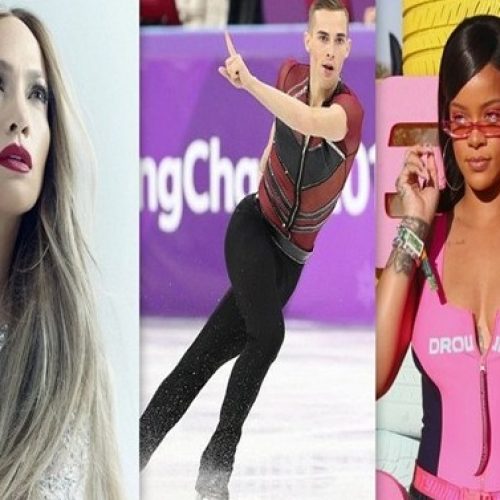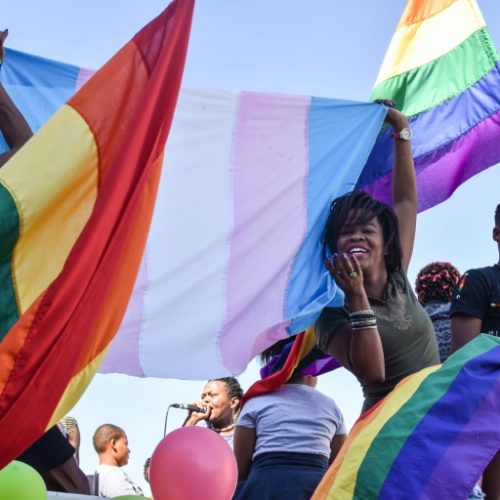Kenny Badmus and South Africa’s Zanele Muholi Bring The Spotlight on Queer Africa
Established to combat the growing cloud of American isolationism after 9/11, the PEN World Voices Festival of International Literature aims to further the organization’s dedication to the freedom of expression through literature and art. This year, the festival has been organized under the chairmanship of Colm Tóibín, and it is the first time in its 11-year history that the content will be focused on a single region of the world. Co-curated by Festival Director László Jakab Orsós and Nigerian author Chimamanda Ngozi Adichie, the program will explore African literature and art — or at least, a fraction of what the vast and diverse continent has to offer.
This year also sees the inclusion of a workshop titled “Queer Futures,” the first time that queer writing will be explored on its own. The event reveals cutting-edge discussion of the continent’s LGBT movements, and participants include Zanele Muholi, a South African visual artist, with a new exhibition at the Brooklyn Museum; Binyavanga Wainaina, a Kenyan author and journalist; Shireen Hassim, a professor of political studies in Johannesburg, South Africa; and Kehinde Bademosi aka Kenny Badmus, Nigerian entrepreneur and writer.
The Pen World Voices Festival of International Literature runs May 4-10. But “Queer Futures” took place yesterday, Wednesday, May 6, 6–7:30 p.m. at the Sheen Center Loretto Auditorium, 18 Bleecker Street, New York City. And Out Magazine caught up via email with Bademosi and Muholi to ask about their art, their ambitions, and their activism. Here, a few of the things they had to share:
Out: Deciding to write about LGBT issues, or write as an LGBT writer in societies renowned for homophobia—what was that decision process like? What issues did you take into consideration?
Kehinde Bademosi: It’s like fish out of water. You suddenly leave a safe zone where very few people have access to you and find everyone who has an opinion in your personal business. Your protective skin is shaven off your back. Your fins are clipped. Your tail is cut off from your body, and everything suddenly becomes shifting sands. Prior to writing about LGBT issues, I was living in the glamour and glee of advertising, [with] big bang commercial shoots in Cape Town, London, Europe, and Dubai. Five-star hotels in cities’ commercial centers. However, when I heard about a bill that would criminalize homosexuals was in the offing in Nigeria, I put my fingers on my computer keyboard and started to write. I knew I was going to lose everything I had worked for. Most of my clients are very homophobic: They are church ministers and Muslims.
The claim of the proponents of the bill was that homosexuality has been a foreign behavior, and no real African was gay. So, it was important that I wrote. To tell my world that “I’m here. I had been here all along.” I wasn’t imported. I didn’t learn to be gay. I am proudly African. I had been with women, and it wasn’t my thing. More importantly, I started to write to reach out to the ones who didn’t have the same platform as I do. The young, vilified, persecuted local gay women and men who thought they needed to conform to the ideology of the oppressors. Lastly, I write because of the heterosexuals who keep making the mistake of trying to change us.
A very beautiful young lady insisted on getting married to me because she thought she had a divine power to make me straight. I do not like the word “straight” when referring to heterosexuals. It’s politically incorrect. The straight ones are the ones who are truthful to whom they are. In that case, I’m straight.
Zanele Muholi: In my work, I deal with black lesbians, gays, bisexuals, and trans friends that have transitioned either from male to female or female to male. And I do so for one major reason: the lack of visual history of black LGBTIs in South Africa. I was forced to take my stand and contribute to South African history, using the visual as a means of articulation. In South Africa, we have a constitution with a clause that protects us, but homophobia is still a challenge that obstructs our sexual freedom. I use the visual because we need to write our histories, we need to make sure that every event is documented, for educational purposes, and also as a way in which we share our queer culture. It’s also important as a means of contesting homophobia. We needed to produce images that challenge the status quo, images that speak against homophobic statements that infest South Africa with xenophobic attacks. So I didn’t just do it for me. I did it for my grandchild, who will one day ask questions. And I’m not alone. People are using different kinds of approaches to make sure our voices are heard, recognized, and respected.
Out: Do you see your work as political or a form of activism? Is writing openly about LGBT issues, or being openly LGBT, inherently political?
Bademosi: What’s the difference? Politics is the fabric that holds the systems of this world in place. The Church, the workplace, the government, the school system, the family and even a common thing as being friendly. There’s a power dynamic at play every time. Someone always has the influence over another. Hence, the deceptive definition of equality. The keyword in both politics and activism is INFLUENCE. How might we influence a system, a people, a generation? Our greatest wish is to see this influence in the hands of people who embrace humanity irrespective of race, sex, identity, status or disability. Influence is activism. Activism is an influence. Politics is an influence. Influence is politics. Our job as social activists is to push influence into the right hands and tools within a system.
Muholi: Being a black lesbian South African is political on its own. You’re dealing with three major layers: of being black, of being female-bodied, of being lesbian. I’m creating a comfortable space in which to understand myself and love myself. My work is political, which is why I call it visual activism, because I use the visual to deal with many issues that other people cannot write about. If history can be written by a layman, then it should also be written by a lesbian who is experiencing different forms of exclusion, different forms of violation. I want to take pictures of lesbian bodies, which is perceived as controversial, because others won’t represent me the way I want. So my work is about the politics of being, of acceptance and resistance, of black lesbians. You know, in hospitals, you have to deal with hospital workers who won’t understand that lesbians have the same anatomies as other women. So we’re pushing a political issue, a political agenda, in ways that have never been dealt with in South African history. And we’re doing it for other lesbians in Africa who don’t have the same sexual rights, who can’t articulate love for themselves, or embrace the intimacy of same gender love.
Out: What has been the trajectory of queer writing in your country over the past few decades? Where do you see it going in the future?
Muholi: South Africa celebrates 21 years of democracy, so we’re talking only two decades, from 1994 to now. We don’t have enough texts that should speak to those 21 years, especially looking at the number of milestones we have won as LGBTI people in the country. But we are dealing with a space that endured much pain, from apartheid, from HIV/AIDS, and now from hate crimes. We are trying, though. Recently, we just had Faces and Phases published, which has faces of people who are out and identify as lesbians and trans. As much as text is important, we stress the importance of the visual as a way to say, ‘We have faces. We are living in your neighborhood. We are working with you. We go to school with you. We go to the same churches with you. We are your family members.’
Out: Is there any story you can give of a particularly meaningful reaction someone had to your work?
Bademosi: Well, I do not just write about being gay and African. I also write about my HIV status. Stigma around HIV/AIDS is also a paralyzing situation for a black gay man. He has to face double stigma for being gay and for being HIV positive. The excerpts from emails below are some of hundreds. I have de-identified the writers, but I left them unedited:
Dear Kenny,
In bed; with my eyes closed and fighting back tears, I silently wish I will wake up from this horrid nightmare to a more reassuring, socially acceptable life! But no! Rather, I wake up to “this” truth…
*
But you stepped out, accepting your own shadow. Well done for doing what I know I may never be courageous enough to do in my lifetime (maybe I’ll drop it as a wonderful surprise information in my Will).
*
The conversation is on! You’ve Nigerians start to talk. People are getting educated. Those of us in the closet are getting encouraged to fight. Please don’t ever stop. You may never know me, but I write as one of the thousands who hide behind their closets to read your stories.
*
Hey Kenny. Hope u r doing fyn…actually it has been about 2 months since I planned to drop a letter of appreciation. To thank you for your courage to stand up in a society where fundamental human rights are being neglected, abused and violated due to stone age norms.
*
I am a Moslem Nigerian and it is very dangerous to be openly gay and still be a moslem where I live. So, I had suffered in silence and followed the crowd for over two decades now. Even though I knew what my true self was, all along. I was just like a log of wood- with no feelings or emotions as I trudged along the path of life living like everyone around me. However, after I read your stories, I MADE UP MY MIND to LIVE this once. I liberated myself from the shackles of belief systems that kept me down and embraced whom I am. Now I’m in a relationship with a guy I had been running away from all along , due to fear. Mind you, I’m still a moslem but I’m relieved of dogmas that come with religion. For once, I feel alive with true love as we both love each other; caring less what the society says about us. Thanks for shinning the light and showing us that we can truly live a life devoid of dogmas and hate. Thank you Kenny. I hope my story goes a long way to help someone like me reading your page.
About author
You might also like
Photographer Slammed for Gay Iwo Jima Photo Re-Creation
Photographer Ed Freeman created the gay flag image to the right more than 10 years ago for the cover of Frontiers magazine. Since then, it has been used across countless
Jennifer Lopez, Adam Rippon and Rihanna feature in Time’s most influential people 2018
Entertainment icons Jennifer Lopez and Rihanna and figure skater Adam Rippon are among Time magazine’s Most Influential People of 2018. They’re three of the celebrities who make a list filled
Botswana’s High Court Rules To Decriminalise Homosexuality
Botswana’s High Court has ruled in favour of decriminalising homosexuality in a landmark decision for campaigners. The High Court rejected laws that impose up to seven years in prison for










21 Comments
Philip
May 07, 04:47TB things. Just as complicated as ever.
Max
May 07, 07:21STFU!!!!!… “TB things”, seriously?
Chris
May 07, 04:56I have always hated straight referring to themselves as STRAIGHT and lgbti complacently agreed to it as
if anthing else is an aberration. I know am not bent for sure, oh most def.
Peak
May 07, 04:59“I’m here. I had been here all along.” I wasn’t imported. I didn’t learn to be gay”
“I do not like the word “straight” when referring to heterosexuals. It’s politically incorrect. The straight ones are the ones who are truthful to whom they are. In that case, I’m straight.”
“So I didn’t just do it for me. I did it for my grandchild, who will one day ask questions”
“others won’t represent me the way I want. ”
My mind received some much needed truth from this. Brilliant brilliant read.
pinkpanthertb
May 07, 05:05You picked out the parts that ministered to me, Peak
Peak
May 07, 05:58My dear! I can be very passionate about my sermons ooooo. Good sermons are hard to comeby these days. I’m like those grannies u find in church with their highlighters in hand and ready to mark out those juicy bible scriptures.
Ace
May 07, 05:03This article looks serious, I’ll come back to read it.
KryxxX
May 07, 05:39“So I didn’t just do it for me. I did it for my grandchild, who will one day ask questions…”
Like my dad would always say, d tree u planted today may not provide you shade but somebody else would thank u for that tree in future even when u r no more.
Our effort maybe minimal but we started it nd it would most definitely grow.
Thank you!
Masked Man
May 07, 05:39Shine the light.
Sasuke Uchiha
May 07, 05:45Tear… I Compel you to go back in
Mitch
May 07, 06:11Beautiful piece. To all of us here who can produce meaningful stuff when we pit pen to paper, let us begin to tell our stories. Only that way will the world know that we exist.
Max
May 07, 07:17“The straight ones are the ones who are truthful to whom they are. In that case, I’m straight.”
Kehinde Bademosi, I wanna be you when I grow up.
You have my total respect, always..
Dennis Macaulay
May 07, 07:18I am a straight man
**gets on office table to yell that**
Ace
May 07, 12:46Hahahahaha… Someone is feeling really motivated.
Diablo
May 07, 07:40The Nigerian is hot and the South African,not so much. Which says alot.
pinkpanthertb
May 07, 07:53About?
Chris
May 07, 18:24@Diablo, pls bail us out, expatiate.
Khaleesi
May 07, 10:55Kenny Badmus, an amazing and inspiring man with several doses of hotness poured in for maximum effect!!!
Sinnex
May 07, 11:23Nice one
Ace
May 07, 13:04Power to these guys. It is not easy to make such a move. Oga Kenny’s mind after hitting the “post” on Facebook with that mind blowing story is one that I envy. I wish them success.
Oluwadamilare Okoro
May 07, 20:48WOW. very inspiring … Mr Badmus sure has words in his mouth.